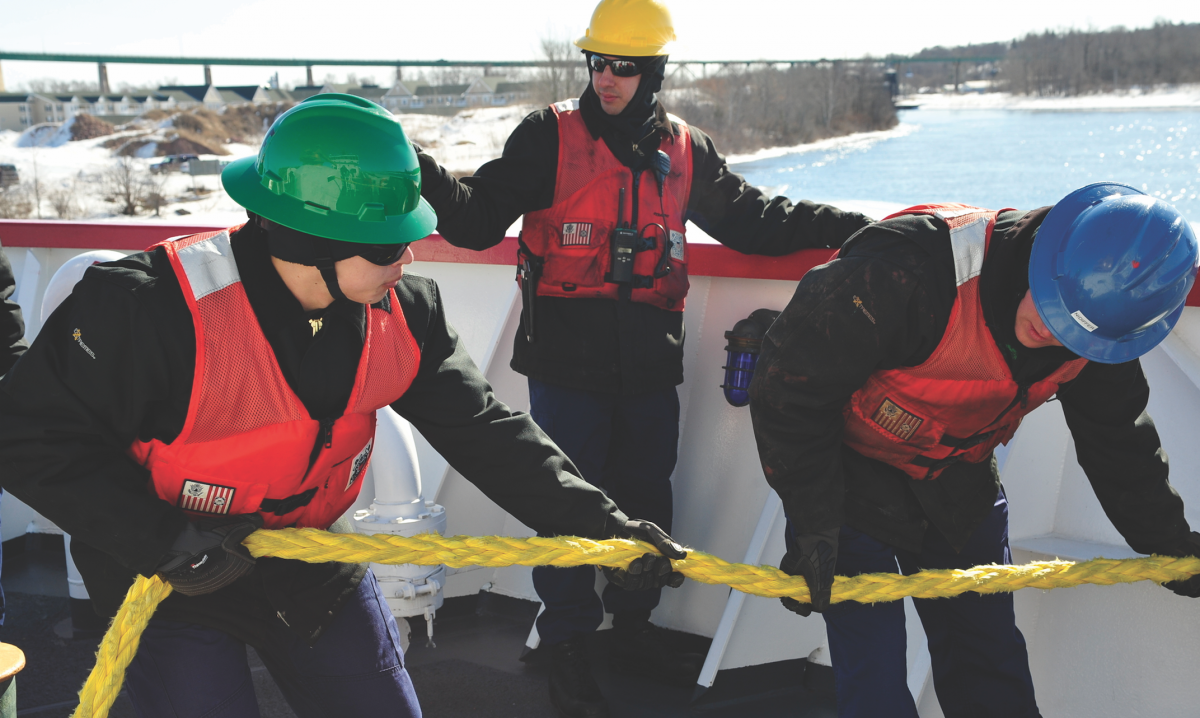
The U.S. seagoing services are steeped in naval traditions. While many are adored and effective, some are outdated and potentially harmful to the enlisted workforce. One of the most misguided traditions of the U.S. Coast Guard is the prescribed break-in watch schedule of “double 4 to 8s,” which promotes chronic sleep deprivation, a hazing culture, and a negative workplace climate.
Working Double 4-to-8s
The first experience a newly reported crewmember encounters on board a U.S. Coast Guard cutter is the double 4-to-8 break-in watch schedule. The infamous watch schedule is the standard many Coast Guard cutters use when new non-rate or petty officers report to the unit. Anyone who has been subjected to it knows the resulting sleep deprivation and exhaustion are grueling.
A sailor on this schedule typically will stand watch from 0315 to 0715, work the regular workday hours from 0800 to 1600, and then head to watch from 1515 to 1915. However, even after the second watch for the day is over at 1915, a sailor is not heading to bed—there are damage control qualifications to work on and helo ops to conduct until 2345. At best, a sailor can expect to spend 18 hours a day working with six hours remaining for sleeping, eating, and hygiene (even omitting fitness or downtime). Realistically, the maximum amount of sleep for these sailors is four hours per night.
Misguided Policy, Mistreated Sailors
This arduous break-in schedule can endure for more than two weeks under way (depending on the watch station) and up to 60 days while in port (on a 1-in-3 rotation). Shore-side petty officers across the Coast Guard say to their non-rates, “At least you do not have to stand double 4 to 8s,” as if it is the measure of how terrible a watch schedule could be.
When asked why this punishing schedule is the standard operating procedure for breaking in a watch station, leadership typically responds, “This is just how it is. It is incentive to get qualified faster.” If the only goal of a break-in schedule is to get the new member qualified as quickly as possible, then this negative reinforcement tactic is not completely misguided. It would be in the better interest of the ship and the crew, however, not only to get new sailors trained quickly, but also to get them trained well.
When it comes to training new sailors well, the double 4-to-8 schedule is ineffective. Besides being inefficient, this schedule also promotes a hazing culture—punishing the new person for being new. Many sailors who later become supervisors carry the belief that because they endured this hardship the next new guy also should, and a vicious cycle of hazing continues.
Chronic Sleep Deprivation
The most salient issue surrounding double 4-to-8 watches is the impact that chronic sleep deprivation has on a sailor’s performance and health. A newly graduated seaman/fireman already has endured eight weeks of sleep deprivation. Adding another two to three weeks of sleep deprivation in an operational environment is a recipe for slowed progress and insufficient learning. Do you want to be the conning officer of the ship at 0400 with the new seaman who was severely sleep deprived when he or she learned how to man the helm? Chronic sleep deprivation creates myriad physical and mental health issues and inhibits overall performance, decision making, learning, and memory, as well as harms personnel readiness and crew safety.
A 1999 meta-analysis of 56 studies involving the mood, motor skills, and cognitive skills of sleep-deprived individuals showed that sleep deprivation has a substantial detrimental effect on human functioning.1 The researchers reported that the mean level of functioning of the sleep-deprived individuals was comparable to the 9th percentile of the non-sleep-deprived subjects. They also found that cognitive performance was affected more by sleep deprivation than even motor performance, and that subjects’ moods were the most affected of the three. Even on motor tasks, the sleep-deprived individuals performed considerably worse than the non-sleep-deprived subjects. In summary, the meta-analysis shows a sleep-deprived individual has slower response times, difficulty thinking, learning, and remembering, and compromised mental health.
Another research article, “A Sleep to Remember,” observed the effects of sleep on memory and found substantial evidence that sleep deprivation has a detrimental effect on the consolidation of episodic, semantic, procedural, and conditioning memory.2 Further, not only has sleep deprivation been shown to inhibit learning, but sleep also has been proven to be an essential component to learning. Harvard Medical School conducted a study where participants learned how to complete a task and then were retested on that task’s skill after different time frames had passed.3 The individuals who were retested within three hours of the original test did not show any improvement. The individuals who were allowed to sleep and then were retested the next day, however, showed a significant improvement in the task’s skill. These findings demonstrate that sleep is a critical and necessary component in authentic learning.

Negative Reinforcement
Aside from the detrimental effects on a sailor’s physical and mental health, the double 4-to-8 schedule is founded on negative reinforcement. Negative reinforcement attempts to increase a desired behavior by rewarding the participant with the removal of a negative stimulus. In other words, the new sailor’s “reward” for becoming qualified in his or her watch station is getting taken off the harsh schedule.
Negative reinforcement in the workplace can lead to a negative workplace climate (or command climate) where employees (sailors) feel bullied and believe bullies are tolerated.4 How can the military eliminate a hazing culture if it still maintains practices that allow and encourage it?
Raise the Standard
Ultimately, transitioning into the military and acclimating to an operational unit is stressful. Why make it more difficult? There is no reasonable argument to be made for subjecting new sailors to the double 4-to-8 break-in schedule as a standard practice. If anything, it should be reserved as a punishment for lackluster progress in becoming qualified.
Having a new crewmember spend time getting qualified on his or her watch station during the 0800–1600 workday should be the standard. A double 8-to-12 break-in schedule would expose the sailor to all the same daytime and nighttime conditions of the watch while still allowing adequate time for sleep, recovery, and true learning. The double 8-to-12 schedule is one valid alternative, but there are numerous other ways that would ensure a sailor gets qualified quickly and effectively without all negative side effects—a win-win situation for the new sailor, the ship, the crew, and the service.
1. J. J. Pilcher and A. I. Huffcutt, “Effects of Sleep Deprivation on Performance: A Meta-Analysis,” Sleep 19, no. 4 (May 1996), 318–26.
2. D. P. Sarode, D. Mathie, N. Gao, L. Gray, I. Monaghan, A. Preston, M. Twomey and M. Watters, “A Sleep to Remember: The Effects of Sleep on Memory,” Res Medica 21, no. 1 (October 2013), 23.
3. R. Stickgold, L. James, and J. A. Hobson, “Visual Discrimination Learning Requires Sleep After Training,” Nature Neuroscience 3, no 12 (December 2000), 237–38.
4. H. Hoel, M. Sheehan, C. Cooper, and S. Einarsen, “Organisational Effects of Workplace Bullying,” in Bullying and Harassment in the Workplace (CRC Press, 2010), 129–47.
Petty Officer Rands-Howard has been serving in the U.S. Coast Guard for five-and-a-half years. She previously served on board the USCGC Gallatin (WHEC-721). She currently is assigned to the Surface Forces Logistics Center in Baltimore, Maryland.
Listen to a Proceedings Podcast interview with this author below:


